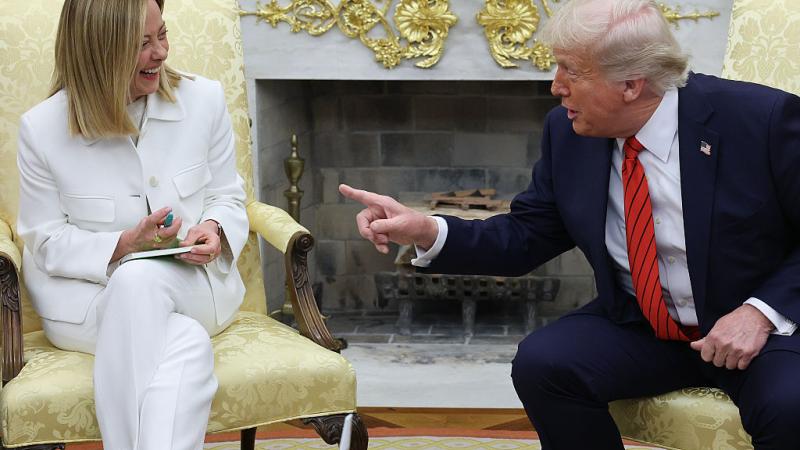Next stage of Russia collusion probe set as Rosenstein points clear finger at FBI
Former deputy attorney general sets stage for Senate to zero in on McCabe, Comey and the FBI.
Former Deputy Attorney General Rod Rosenstein made clear in his Senate testimony he is no Harry Truman or Janet Reno, two larger-than-life Washington figures from yesteryear who embraced the idea that no matter what went wrong on their watch the bucks stops at the top.
During three-plus hours of uncomfortable interrogation by Republicans and Democrats alike, Rosenstein repeatedly tried to blame others – the FBI and its former deputy director Andrew McCabe often – for failures in a Russia probe he personally supervised.
Rosenstein testified he would not have signed the Foreign Intelligence Surveillance Act warrant targeting Trump adviser Carter Page for a fourth time in summer 2017 if the FBI had just told him about exculpatory evidence.
He acknowledged the Robert Mueller special counsel probe went on for 18 more months after the FBI knew, by August 2017, that there was no evidence of collusion between the Trump campaign and Russia during the 2016 election.
And he claimed the FBI kept him in the dark about the fact that its field agents had recommended closing down an investigation of Trump national security adviser Michael Flynn all the way back in January 2017.
McCabe, the former deputy director and acting director of the FBI, “was not fully candid with me,” Rosenstein said in explaining how he could be so in the dark on so many critical Russia probe issues.
Rosenstein’s performance before the Senate Judiciary Committee on Wednesday frustrated many of the committee’s members.
“He acted like he wasn't responsible and, you know, that it was somebody else's responsibility to verify these facts,” Sen. Josh Hawley, R-Mo., said on Fox News after the testimony.
Texas Sen. Ted Cruz, R-Texas, took Rosenstein to task during the middle of the hearing.
“You came into a profoundly politicized world and yet, all of this was allowed to go forward under your leadership,” Cruz said. “That, unfortunately, leads to only two possible conclusions—either you were complicit in the wrongdoing, which I don’t believe was the case, or that your performance of your duties was grossly negligent.”
Rosenstein could only muster this in response: “You always wish you could have done more.”
Frustrations aside, Chairman Lindsey Graham, R-S.C., got exactly what he wanted out of the hearing as he begins to build his case that wayward FBI leaders allowed a flawed investigation to go forward and hamper Trump’s early presidency unnecessarily and possibly illegally.
There are millions of Americans pretty upset about this,” Graham said. “There are people on our side of the aisle who believe this investigation, Crossfire Hurricane, was one of the most corrupt, biased criminal investigations in the history of the FBI. And we’d like to see something done about it.”
Time and again, Rosenstein tried to suggest to the senators the corrupting of the probe occurred on the FBI’s side, not his.
Here are the key revelations:
Collusion was ruled out early on
"The whole concept, that the campaign was colluding with the Russians, there was no 'there' there in August of 2017, do you agree or not?," Graham asked.
"I agree with the general statement," Rosenstein replied.
The FBI lacked candor and transparency with DOJ
Rosenstein in many cases appeared to be admitting that he himself was significantly in the dark about the FBI’s early Russian investigations and that McCabe had not been candid with him.
Agent’s recommendation to close Flynn probe was kept secret from him
Rosenstein was asked by Graham if he knew that "in January of 2017, the FBI field office said, 'we recommend General Flynn be removed'" from the F.B.I.'s investigation into Russian interference in the 2016 election.
"I did not," Rosenstein responded.
"Would that have mattered?" Graham asked, to which Rosenstein responded: "Yes."
In hindsight, Rosenstein wishes he did not sign the third FISA renewal.
Rosenstein also told senators that he would not have signed the third and last renewal of the FISA warrant for Trump associate Carter Page if he had been aware of exculpatory information withheld from the FISA court. "If you knew then what you knew now, would you have signed the warrant application?" Graham asked.
"No, I would not," Rosenstein said.
Rosenstein later indicated that he was not familiar with the full contents of that renewal request. Though he earlier claimed to have read it, he later conceded that he hadn’t read “every page” but that he had reviewed it and was familiar with its contents.
A careful denial about the 25th Amendment plot
Rosenstein denied he ever tried to remove the president from office under the 25th Amendment of the Constitution. “The idea that I was involved in some conspiracy to get the president is ridiculous,” he answered at one point.
When pressed by Sen. Mazie Hirono, D-Hawaii, if he ever would “suggest or hint at secretly recording President Trump?” as McCabe has suggested, he denied it again.
“I did not suggest or hint at secretly recording President Trump," he answered.
Hirono pressed further, “Have you ever discussed with anyone the possibility of invoking the 25th Amendment to remove this president from office?”
Rosenstein then responded more indirectly. “I have never in any way suggested that the president should be removed from office in the near term.”
McCabe said later Wednesday he believed Rosenstein wasn’t telling the truth. “Mr. Rosenstein’s claims to have been misled by me, or anyone from the FBI, regarding our concerns about President Trump and the Trump campaign’s interactions with Russia are completely false,” McCabe said.
The next steps
Rosenstein’s finger pointing at the FBI opens the door for his committee to interview behind closed doors several frontline players inside the bureau and Justice Department over the next few weeks, and possibly set up another epic hearing with the likes of James Comey and McCabe later this summer.
The question that Graham has now set up in public with Rosenstein’s testimony is clear: Were the FBI missteps in the Russia probe, like keeping Rosenstein in the dark, bureaucratic bungling or an illegal plot to deceive the courts and the nation and to hinder the Trump presidency.
















